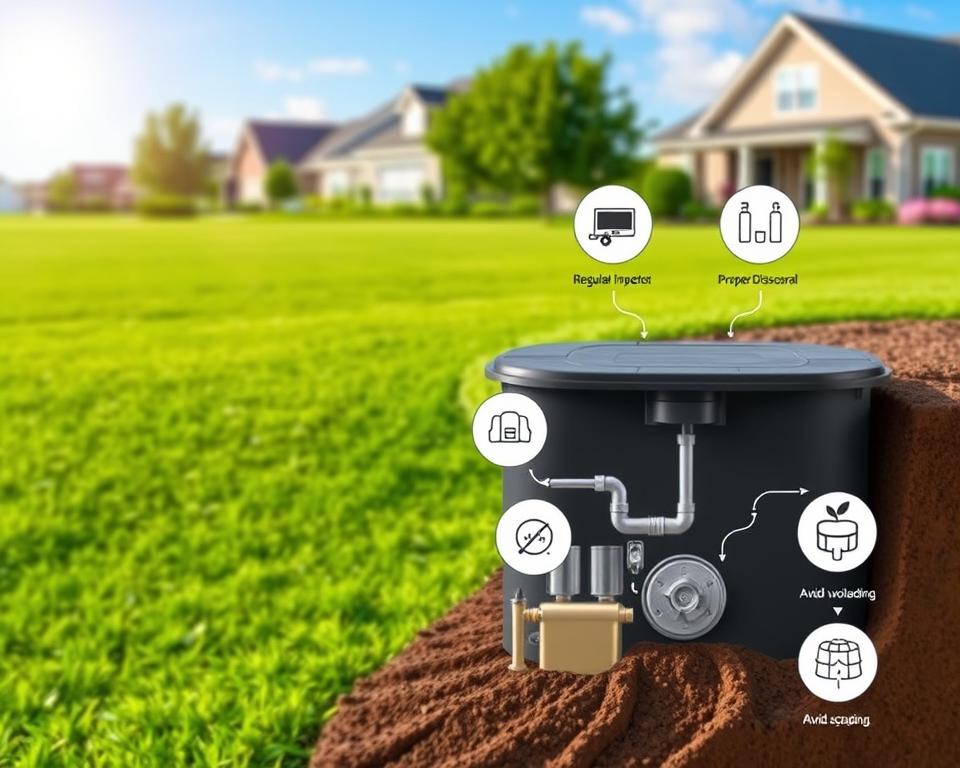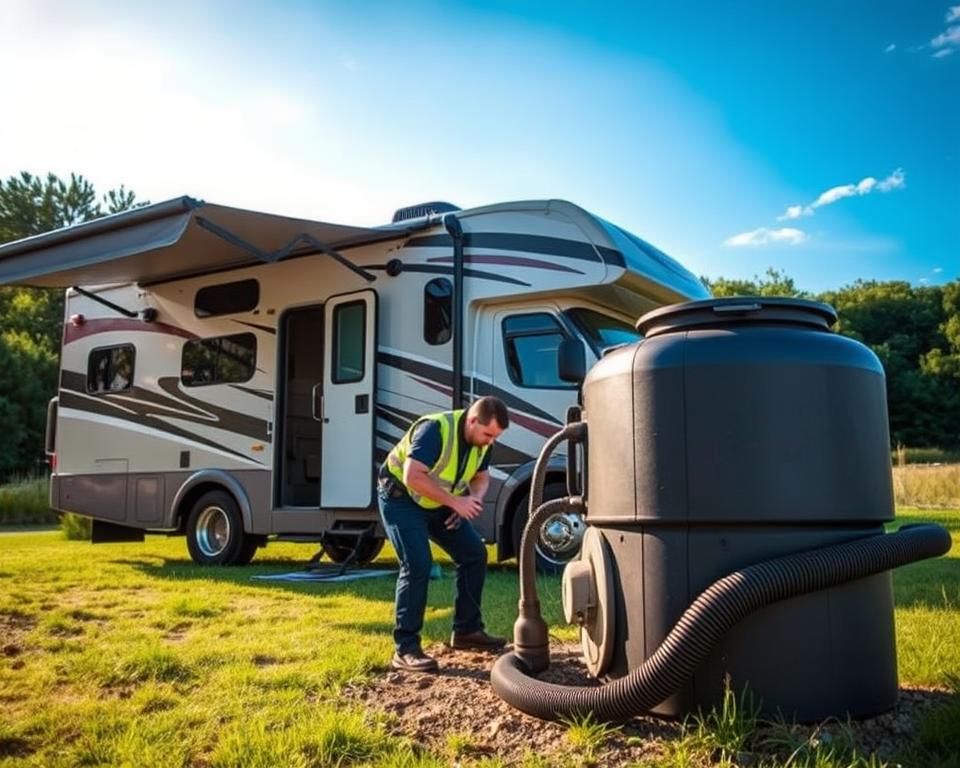How Property Size Affects Septic Tank Inspection in Simi Valley
Your Expense Guide for Septic Tank Pumping
Have you wondered about the real price of up‑keeping your septic system current, or whether you’re paying too much? It’s vital for homeowners to comprehend the particulars of septic tank pumping prices. Typically, the price tag sits near $420, however it can fluctuate considerably. This variance results from elements like your system’s capacity and geographic area – septic service near me.
Scheduled upkeep of your septic tank avoids hefty repairs, highlighting the necessity of knowing service costs. We aim to dive into septic tank service pricing comprehensively. This will allow you to budget cost‑effectively for your system’s maintenance.
Core Messages
- Average septic tank pumping costs about $420.
- Prices can fall between $290 and $560 USD depending on various factors.
- Regular servicing heads off larger repairs in the future.
- Most households call for pumping every 3 to 5 years.
- Family size and water usage can influence pumping frequency.
Understanding the Importance of Septic Tank Pumping
Septic tank pumping is essential for a smooth‑running effluent system. It gets rid of solids that, if not addressed, cause blockages. Timely pumping also avoids bad smells but also fends off steep repair costs.
Neglecting septic tank maintenance can compromise our wide use on these systems. Thankfully, affordable services minimize the risk of system failure. Scheduled upkeep extends your septic system’s life, helping maintain smooth operation.
Cost data for septic tank upkeep illustrates the value of preventive care. Maintenance detects problems early, avoiding severe damage and steep repair bills. Regular pumping is a prudent move for homeowners to protect their asset and gain peace of mind.
Average Costs for Septic Tank Pumping
Septic tank pumping typically comes between $250 USD and $600 in cost. In most cases, homeowners will spend about $400 for this critical service. Fee differences are attributed to elements like capacity, property location, and how often maintenance is scheduled. Typical tanks, around 1,000 gallons, usually cost between $225 and $400 USD.
Homeowners should realize the necessity of allocating funds every three to five years for septic tank cleaning. This scheduled care relies on the usage level and size. It helps avert bigger, more expensive issues down the road, proving to be both time and money‑efficient.

Factors Influencing Septic Tank Pumping Prices
Multiple considerations are key in establishing the cost of septic tank pumping. Understanding these details helps homeowners to budget for these essential services effectively.
The tank’s size matters greatly. Bigger tanks require more effort and time to empty, which results in increased fees. The accessibility to your tank also greatly impacts the price. Tanks buried deep or in difficult locations require more labor and specialized equipment from technicians, thus hiking the labor costs.
Costs can vary widely depending on where you live. This is due to variations in local labor rates and dumping charges. For example, some areas impose higher charges for disposing of waste, influencing the final service cost. Moreover, tanks with dense solid waste accumulation also incur additional fees—anywhere from $100 USD to $300 USD. Plus, the more frequently a tank needs pumping—due to higher water usage—the higher the ongoing expenses.
Septic Tank Size and Its Impact on Cost
The capacity of your septic tank clearly affects the cost of its upkeep. Compact tanks, such as, those that can hold 750 gallons, typically have lower pumping costs, usually ranging from $175 USD to $300 USD. On the other hand, higher‑capacity tanks, capable of holding up to 1,750 gallons, may incur charges between $400 and $700. The majority of single‑family residences have tanks that hold between one thousand to twelve‑fifty gallons, providing a mix between size and efficiency.
Households with smaller tanks or higher numbers of occupants often need more frequent pumping services, which raises the overall expense. It’s crucial to conduct regular septic tank inspections in these situations. This ensures the tank does not overflow or malfunction, which helps avoid additional damages. By recognizing the connection between tank size and service fees, homeowners can reach well‑informed choices regarding their septic systems and their upkeep demands.
Location‑Based Changes in Septic Tank Pumping Costs
Septic tank pumping costs can vary substantially based on location. In urban areas, the expenses are frequently higher due to local septic services having increased overhead. For example, Minneapolis, MN residents may spend between $180 USD and $280, while those in Portland, OR could see prices from $440 to $750.
The reasons behind these gaps are many. They include cost of living, call for septic specialists, and area‑specific regulations. In places where septic services are scarce, homeowners might pay more due to the fewer choices. Moreover, stringent regulations in some regions can raise the need for higher compliance fees, impacting the cost of services.
Understanding about these geographic cost variances is essential for homeowners. It enables them to plan their septic maintenance spending more precisely. By recognizing local pricing, they can seek quotes from specialists wisely, caring for their septic system efficiently without breaking the bank.
Additional Costs to Consider with Septic Tank Pumping
Homeowners often forget about various additional maintenance costs associated with septic tank pumping. The primary cost pays for just the basic service, excluding other potential expenses. Knowing these can assist with building a complete budget.
Video line checks, for instance, range between $250 to $500 USD. They offer a no‑dig look into the system’s condition. Additionally, filter maintenance, which if ignored can lead to system failures, represents another cost.
The spread for repairs can be wide, from $100 to $4,000, according to the specific issues. This range highlights the importance of factoring in additional maintenance costs for future budgeting.
Budgeting for Septic Tank Maintenance
When planning for septic tank care, it’s vital to adopt a comprehensive view. This covers several critical elements. Owing to variable factors, the cost of maintenance can vary considerably. Therefore, proper financial planning is essential.
To make sure your system operates efficiently and to avoid unforeseen bills, keep these intervals and services in mind:
- Scheduled pumping: This service is usually required every 3–5 years.
- Inspections: Budget for around $250 USD to $1,180 USD for inspections every three years.
- Potential repairs: Reserve a fund for unexpected fixes, which can occur unexpectedly.
Setting up a routine maintenance calendar with a trusted septic service is essential. By expecting these expenses, homeowners can evade the large costs tied to neglect. This strategy ensures the life span and performance of their septic systems.
Typical Indicators That Your Septic Tank Needs Pumping
Staying alert to your septic system’s condition is vital. Recognize the first indicators that suggest your septic tank needs pumping. Doing so can avert significant damage and reduce repair costs.
- Slow drains: Water taking longer to drain in sinks, tubs, or toilets could indicate your septic tank is too full.
- Unpleasant odors: Bad smells around the septic tank or in your yard are frequently red flags of a problem.
- Gurgling sounds: Odd gurgling from your plumbing might show air is trapped because of a blockage.
- Wet spots: Puddles or greener grass sections near the drain field suggest waste seepage from the tank.
- Dark green grass: Grass that is darker and looks richer around the drain field may point out leakage of nutrients, hinting at an issue.
Regular checks by septic system specialists can ensure your tank is in proper order. Relying on skilled septic technicians for maintenance stops these issues, guaranteeing your system’s longevity.
Benefits of Routine Septic Tank Inspections
Frequent inspections are key to keeping your septic system in excellent order. They pinpoint potential problems before they grow into costly repairs. By hiring professionals for these checks, every part of your system gets a thorough assessment.
The inspection examines various parts of your system, including waste levels and the drain field’s condition. It confirms that critical parts, like baffles, work as they should. Spotting issues sooner avoids hazardous overflows and shields the environment, benefiting both your home and the wider community.
Scheduling your septic tank checked every three years can reduce a lot of money. It prevents bigger issues from arising due to neglect. This not only cuts on repair costs but also gives your peace of mind.
| Inspection Aspect | Importance |
|---|---|
| Waste Level Assessment | Prevents overflow and backups |
| Drain Field Evaluation | Identifies saturation and function |
| Component Functionality Check | Ensures proper system operation |
| Early Problem Detection | Saves on repair costs |
Strategies to Cut Costs on Septic Tank Pumping Prices
Homeowners trying to lower septic tank pumping costs have multiple strategic options. Setting up group services with neighbors is one efficient method. This involves coordinating with others nearby to book services together, potentially securing group discounts. It’s a way to build community bonds while controlling expenses more economically.
Another helpful approach is to sign up for maintenance plans with septic service providers. These plans often offer discounted prices for regular check‑ups and pumpings, keeping septic systems working properly at a lower cost. Homeowners are encouraged to ask about these plans when contacting service companies.
Making the septic tank accessible can also help reduce pumping expenses. Good accessibility means there’s no requirement for extra labor charges. It’s important to keep the area around the tank unblocked, allowing for straightforward servicing.
Practicing certain habits helps in prolonging the time between pumpings as well. Lowering water usage and limiting garbage disposal use are critical practices. These actions can significantly boost septic system health, lowering the need for regular maintenance. By embracing these habits, homeowners can successfully trim their septic tank pumping costs, safeguarding their wallets and systems.
In Summary
Making sure regular septic tank pumping is key for homeowners who want to keep their waste management system efficient and in top shape. Understanding about the costs involved enables effective budgeting. This way, you can secure cost‑effective septic services without compromising your system’s performance.
Embracing a proactive approach to maintenance is very beneficial. By watching for signs that indicate the need for pumping, you can avoid costly repairs and lengthen your system’s lifespan. Such actions not only improve your home’s functionality but also provide you peace of mind.
To wrap up, keeping up with routine inspections and timely septic tank pumping is essential for efficient home maintenance. By giving importance to proper planning and choosing affordable septic service, you’ll guarantee your septic system remains operational and efficient for many years.

